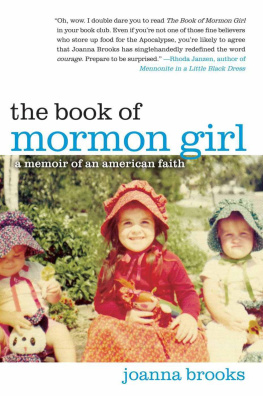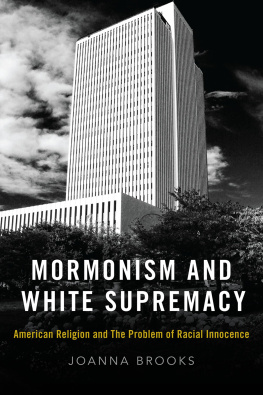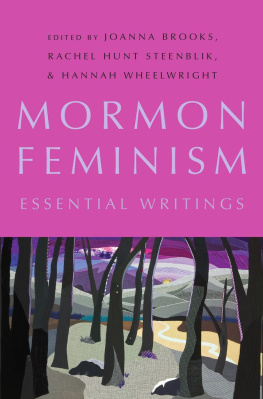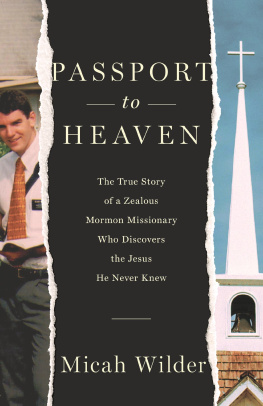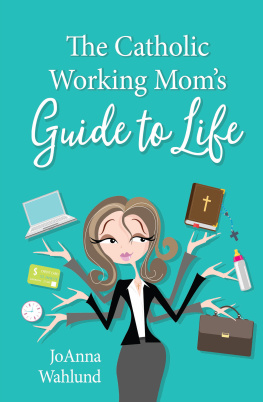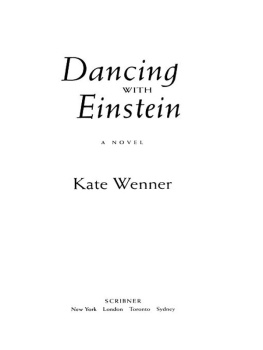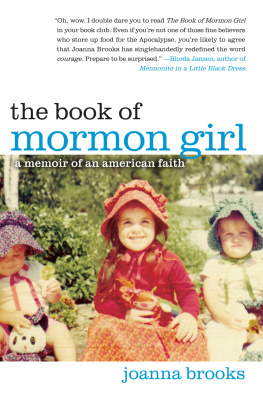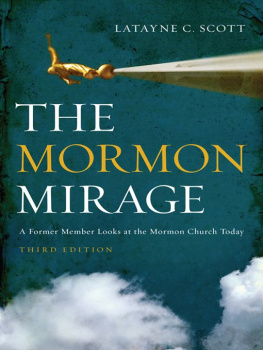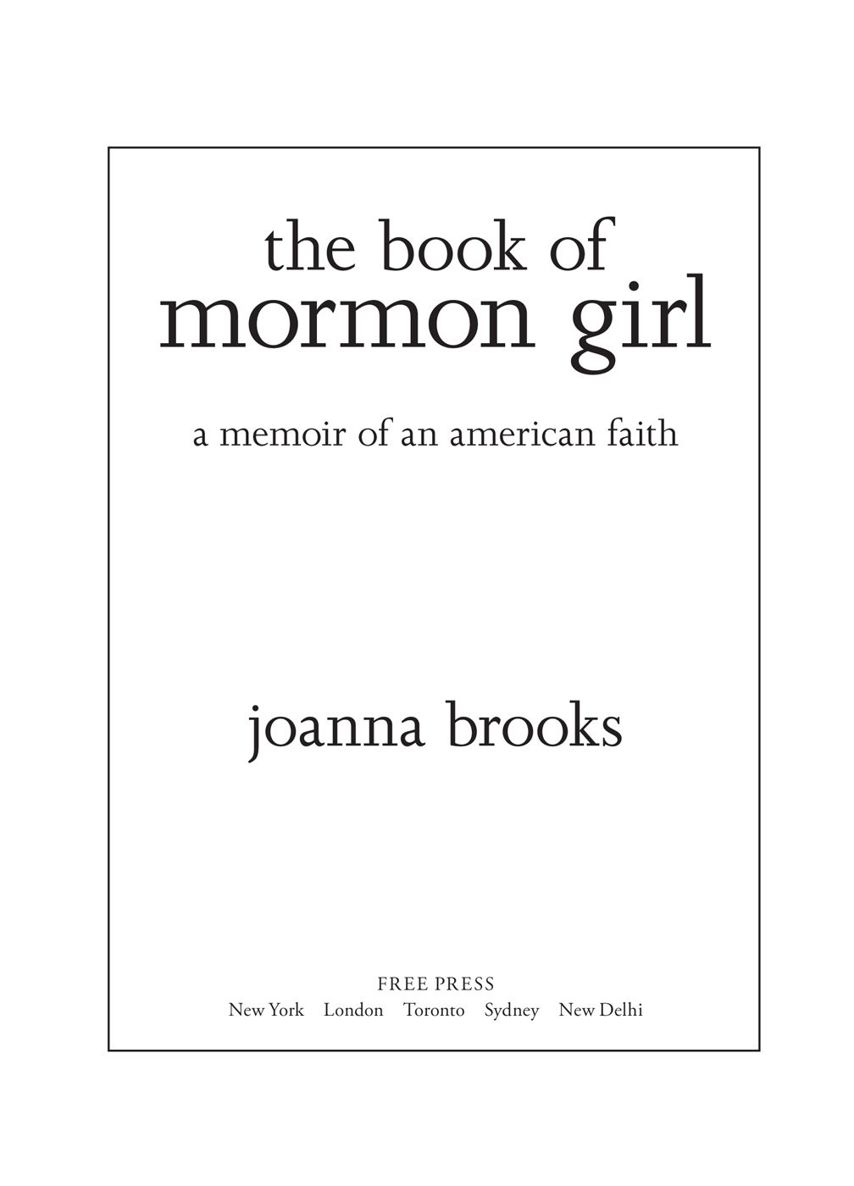Praise for Joanna Brooks and The Book of Mormon Girl
This is an utterly necessary memoir.
Carolyn Forch, celebrated poet and human rights activist
Joanna Brooks sheds the candid, genuinely informative light Ive been looking for on this Mormon moment in American life.
Krista Tippett, host of American Public Medias On Being
This story is beautifully, universally true. It gives me hope. Hope for our miscounted daughters, for our misunderstood grandmothers, and for the achingly faithful hearts, like mine, still beating and bleeding for peace, tolerance, and the seemingly lost cause of human respect. It gives me hope for our common lineage: love.
Karen Maezen Miller, author of Momma Zen: Walking the Crooked Path of Motherhood and Hand Wash Cold: Care Instructions for an Ordinary Life
Joanna Brooks captures Mormonism in revealing but tender ways that are sure to resonate with insiders and outsiders alike. Mormonism may not yet have found its Chaim Potok, but it has its Joanna Brooks.
R. B. Scott, author of Mitt Romney: An Inside Look at the Man and His Politics
Joanna Brooks defies Mormon stereotypes.
Politico.com
Laugh-out-loud funny and break-your-heart poignant, The Book of Mormon Girl delivers an ironic triumph: a little girls religion invests her with enough history, bravery, and devotion that the woman she becomes can only stand up to her people and say, No! We are better than that! A delicious and hopeful journey.
Carol Lynn Pearson, author of Mother Wove the Morning and No More Goodbyes: Circling the Wagons Around Our Gay Loved Ones
Joanna Brooks draws upon a rich spiritual legacy in this compelling memoir of being found and lost and found again. What she describes as a fierce and hungry faith leaps off the page with passion, galvanizing readers who strive for justice and want to live their religion on their own terms. She is a contemporary Mormon pioneer.
Jana Riess, author of Flunking Sainthood and Mormonism for Dummies
Joanna Brookss narrative is, by turns, disarming, funny, wrenching, and inspiring. Steeped in the quaint, nourishing ways of a Southern California Mormon home, she was a root beer among the Cokes of her non-Mormon schoolmates: sparkling, different, no caffeine. She grew up and grew conflicted, finding herself in a decade-long exile from her conservative people. Badly wanting her daughters to know what her grandmothers knew, to lay claim to the curious beauty and power of her religious heritage, Brooks at last declares herself not an enemy: I will not be disappeared from the faith of my ancestors. She returns as a Coke among Mormon root beers: still different, still sparkling. Her version of the Mormon story is unorthodox, uncommon, and lyrical. This is a quietly fierce, authentic, and faithful voice, one that insists her religious tradition is young, and the next chapter yet to be written.
Philip Barlow, Arrington Chair of Mormon History and Culture, Utah State University
Thank you for purchasing this Free Press eBook.
Sign up for our newsletter and receive special offers, access to bonus content, and info on the latest new releases and other great eBooks from Free Press and Simon & Schuster.

or visit us online to sign up at
eBookNews.SimonandSchuster.com
for ella and rosa
Contents
plan of salvation
O n Monday nights, my father and mother gathered their four children around the kitchen table in our tract house on the edge of the orange groves and taught us how the universe worked.
Sometimes they used a stack of cotton work gloves to demonstrate the thin illusoriness of this life. Your spirit is like this hand, my father would say, wiggling his fingers. Your spirit has always existed. When you were born, your spirit went into your body and a veil of forgetfulness was drawn across your mind. He slipped his hand into the glove. When you die your spirit will leave your body and join the spirits of your ancestors on the other side of the veil, he said, withdrawing his hand from the glove, and leaving it an inert heap on the Formica tabletop. Death was made as small and familiar to me as changing clothes, and this life a moment of forgetfulness on a long, long thread of being.
Sometimes too my parents taught us about the farm-boy prophet Joseph Smith, who long ago in upstate New York had gone into a grove of trees, gotten down on his knees, and put his questions directly to God, who, with His son Jesus, appeared directly to Joseph Smith and then sent angels to reveal new books of scripture and new ways of being. Every night when I knelt on the little crocheted orange prayer rug at the side of my bed, I prayed to a God that heard and answered. Sometimes too I had dreams and God spoke kindly to me in my dreams, and I woke with wet eyes, so disappointed to be back on the forgetful side of the veil that separated this world from the next.
When we children were asleep, my auburn-haired mother stayed up late, late, late, pulling the names of our ancestors out of thickets of old records, to reorder them all for eternitys sake in a baby-blue Book of Remembrance with the outlines of Mormon temple spires embossed on the cover in gold. Sometimes, in the morning, standing in the kitchen, she would tell us how dark forces had surrounded her late at night to encumber her work, but our ancestors stepped through time, straight through the walls of our tract house in the orange groves, identifying themselves by name and declaring that they would protect her.
I grew up in kitchens where bushels of backyard-grown green beans were canned and put up for the winter, habits of pioneer preparedness, steam on the kitchen windows against the perfect California sunshine outside. On the refrigerator hung a calendar from the local Mormon mortuary, each month a picture of a different Mormon temple around the globe: in Arizona, London, Switzerland, or Los Angeles. I grew up riding in fleets of blue-paneled family vans, bench seats loaded with children, all going to church in our play-clothes on a Wednesday afternoon, everything perfectly understood among us, all the lyrics memorized, nothing to be explained.
Early on Sunday mornings, the fourteen-year-old boys from church knocked on our front door to gather in the tithes and offerings. Later, my parents, brother, sisters, and I sat together in wooden pews, sang pioneer hymns, and took a white-bread-and-tap-water sacrament passed on plastic trays. On Sunday afternoons, my father, who worked all week as an engineer but gave his weekends to service as the bishop of our congregation, stayed behind to hear all the confessions and woes of the people: all their secrets he tucked away in the breast pocket of his polyester Sunday suit. And most Sunday evenings, seventy-something-year-old Sister Pierce would appear on our doorstep, a homemade strawberry pie in her hands, an offering to my father, the bishop, who one midnight in a cold hospital room had anointed her head with consecrated olive oil and given her a healing blessing.
This is how I came into this world, into this world of believing: an ancient spirit striving to remember the shape of eternity at the kitchen table, in a house where ancestors knew our names and stepped through the walls, my dreams filled with light, my head consecrated with oil, every Sunday morning white bread and tap water for sacrament, every Sunday evening the taste of a ripe glazed strawberry saying grateful on my tongue.

